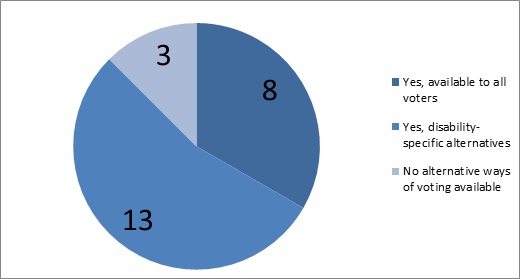Are alternative ways of voting available to persons with disabilities?
Although most people cast their votes at polling stations, other methods of voting such as postal voting, e-voting, or voting by proxy are also possible. These alternative means of voting can either be available to all voters or designed to enable those who are unable to reach a polling station on election day, for example because of absence, residence abroad or illness, as well as disability, to vote.
While different ways of voting can enfranchise people who would otherwise be prevented from exercising their right to vote, these measures should not be used as an alternative to making voting processes more accessible. General “reliance on […] alternative voting as a way to ensure the political participation of persons with disabilities would not be consistent with the general obligations undertaken by state parties under articles 4 and 29 of the convention”.
Are alternative ways of voting available to persons with disabilities?

Note: those EU Member States for which no data was provided by ANED experts are excluded from this figure.
Source: Lawson, 2014
In eight EU Member States, Austria, Denmark, Finland, Germany, Estonia, Lithuania, the Netherlands and the United Kingdom, all voters can vote using alternative methods, typically postal voting. In the Netherlands and the United Kingdom, proxy voting is permitted, although in the Netherlands nobody may cast more than two votes by proxy in their lifetime.
In a second group, comprising nearly half (13) of EU Member States, alternatives to voting at a polling station are available only to persons with disabilities or health problems. The most common measure is for voting to be permitted at the voter’s place of residence, in the presence of electoral officials. In Ireland, Luxembourg and Poland, however, postal voting is available for persons whose disability or health problem prevents them from getting to a polling station, while proxy voting is a possibility for these individuals in Poland and Sweden.
In Cyprus, Greece and Portugal, votes may only be cast in polling stations.